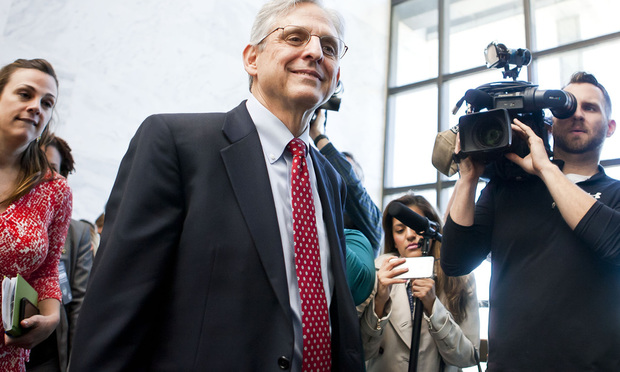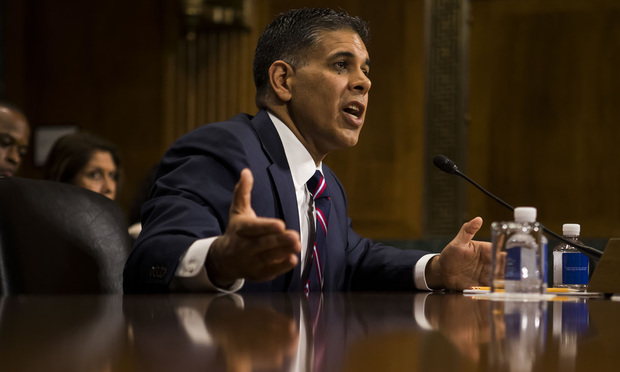Appellate Judges Have a Thing About Citing 'My Cousin Vinny': Merrick Garland Edition
The 1992 film shot in Georgia (depicting Alabama) is a favorite for judges.
March 05, 2019 at 04:32 PM
6 minute read
The original version of this story was published on National Law Journal
 Merrick Garland. Credit: Diego M. Radzinschi / NLJ
Merrick Garland. Credit: Diego M. Radzinschi / NLJ
Judge Merrick Garland's opening lines of an opinion Tuesday shouldn't have startled any reader: “In 1992, Vincent Gambini taught a master class in cross-examination. Trial counsel for the National Labor Relations Board and the National Union of Healthcare Workers apparently paid attention.”
Garland's footnote gives it away but, of course, Gambini is the namesake in the classic 1992 comedy “My Cousin Vinny.” Joe Pesci starred as Vinny the lawyer, defending a cousin and a friend who are falsely accused of murder in Alabama (although the movie was filmed in and around Monticello, Georgia).
Garland, the chief judge on the U.S. Court of Appeals for the D.C. Circuit, was particularly struck by Vinny's masterful cross-examination of a prosecution witness, which you can watch here:
Garland's citation to “My Cousin Vinny”—in a ruling that was a win for federal labor regulators—marked the latest instance of a judge who found some moment so compelling as to make note of it in a court ruling. A Wall Street Journal examination in 2017 found judges had cited “My Cousin Vinny” more than two dozen times.
“There are a lot of legal movies that are just kind of nonsense,” Raffi Melkonian, an appellate litigator at Houston's Wright Close & Barger, told the Journal. “For whatever reason, 'My Cousin Vinny' feels real.”
Here are some other times—by no means exhaustive—where federal appeals judges have given a nod to Vinny.
 Judge Amul Thapar testifies in 2017 before the Senate Judiciary Committee during his confirmation hearing for the U.S. Court of Appeals for the Sixth Circuit. Credit: Diego M. Radzinschi / ALM
Judge Amul Thapar testifies in 2017 before the Senate Judiciary Committee during his confirmation hearing for the U.S. Court of Appeals for the Sixth Circuit. Credit: Diego M. Radzinschi / ALM>> Sixth Circuit Judge Amul Thapar, writing last September in the case Doe v. Baum: “Even popular culture recognizes the importance of cross-examination. See A Few Good Men (Castle Rock Entertainment 1992) (depicting one of the most memorable examples of cross-examination in American cinema); My Cousin Vinny (Palo Vista Productions et al. 1992) (demonstrating that cross-examination can both undermine and establish the credibility of witnesses).”
>> Then-D.C. Circuit Judge Janice Rogers Brown, writing in March 2017 in the case United States v. Bronstein: “And yet, in a coordinated fashion, each appellee is alleged to have directed a variation of the same message to the Justices of the Supreme Court and the assembled audience. Their coordinated standing, facing the bench, and messaging indicate the appellees were addressing the court and gallery. Cf. MY COUSIN VINNY (20th Century Fox 1992) (Judge Chamberlain Haller: 'Don't talk to me sitting in that chair! … When you're addressing this court, you'll rise and speak to me in a clear, intelligible voice.'). Viewed objectively, these alleged acts could easily be considered speeches to a public assembly that tended to disrupt the court's operations—conduct covered by §6134's prohibition of 'make a harangue or oration.'”
>> Second Circuit Judge Peter Hall, writing in July 2016 in the case Walsh v. New York City Housing Authority: “To use the apt metaphor coined by Vincent Gambini (one that seems only fitting given the facts of this particular case), a plaintiff may satisfy her burden by building a wall out of individual evidentiary bricks.” In dissent, Judge Debra Ann Livingston took on Hall, writing: “The majority invokes the film My Cousin Vinny in its discussion of the role of circumstantial evidence in Title VII cases. The film might more aptly be cited for the proposition that some individuals, such as Mona Lisa Vito, Vinny Gambino's fiancée who gained expertise in automotives and auto mechanics working in her father's garage, are well qualified despite a lack of formal credentials.”
>> Seventh Circuit Judge William Bauer, writing in September 2009, in the case Sutherland v. Gaetz: “Defense counsel's obstinate behavior and the court's exasperation with it may be reminiscent for some of the contentious interplay between the fictional characters of Vincent LaGuardia Gambini and Judge Chamberlain Haller in the film 'My Cousin Vinnie.' On three separate occasions during trial, Judge Haller held Vinnie in contempt and, each time, made him spend the overnight recess in jail. However, unlike defense counsel here, Vinnie, a New York lawyer struggling to adapt to the rural-Alabama trial setting, found that the accommodations in jail offered the best night's sleep he could find away from the Big Apple. Upon his return to the courtroom, a revitalized Vinnie dismantled the credibility of the State's circumstantial case and cleared the names of the 'two yutes' he represented. (And again we see that life follows art.)”
>> Seventh Circuit Judge William Bauer, writing in April 1997 in the case Bass v. Stolper Koritzinsky Brewster Neider: “Theft, like fraud, is a specific intent crime. To obtain a conviction, the government must prove beyond a reasonable doubt that the defendant intended to deprive the owner permanently of some property. Someone who appears to have shoplifted may then, of course, have a valid defense—that he did not act with the requisite intent. One who walks out of a country store with a can of tunafish in his pocket that he forgot to pay for has not committed theft. The facts, however, may have terrible consequences before the defense can be raised. See, e.g., My Cousin Vinny, at Local Blockbuster Video Rental Store.”
Read more:
Citing 'My Cousin Vinny,' DC Circuit Upholds SCOTUS Protest Ban
In Quoting Profanity, Some Judges Give a F#%&. Others Don't
This content has been archived. It is available through our partners, LexisNexis® and Bloomberg Law.
To view this content, please continue to their sites.
Not a Lexis Subscriber?
Subscribe Now
Not a Bloomberg Law Subscriber?
Subscribe Now
NOT FOR REPRINT
© 2025 ALM Global, LLC, All Rights Reserved. Request academic re-use from www.copyright.com. All other uses, submit a request to [email protected]. For more information visit Asset & Logo Licensing.
You Might Like
View All
Sanctions Order Over Toyota's Failure to Provide English Translations of Documents Vacated by Appeals Court
4 minute read
Second Circuit Upholds $5M Judgment Against Trump in E. Jean Carroll Case
4 minute read
'Paragraph V Displaced Lathrop': High Court Mulls Sovereign Immunity Waiver Disputes
7 minute read
11th Circuit Revives Project Veritas' Defamation Lawsuit Against CNN
Trending Stories
- 1AstraZeneca Files Flurry of Lawsuits to Protect Cancer Treatment Drug
- 2American Airlines Legal Chief Departs for Warner Bros. Discovery
- 3New Montgomery Bar President Aims to Boost Lawyer Referral Service
- 4Deadline Extended for Southeastern Legal Awards
- 5Church of Scientology Set to Depose Phila. Attorney in Sexual Abuse Case
Who Got The Work
Michael G. Bongiorno, Andrew Scott Dulberg and Elizabeth E. Driscoll from Wilmer Cutler Pickering Hale and Dorr have stepped in to represent Symbotic Inc., an A.I.-enabled technology platform that focuses on increasing supply chain efficiency, and other defendants in a pending shareholder derivative lawsuit. The case, filed Oct. 2 in Massachusetts District Court by the Brown Law Firm on behalf of Stephen Austen, accuses certain officers and directors of misleading investors in regard to Symbotic's potential for margin growth by failing to disclose that the company was not equipped to timely deploy its systems or manage expenses through project delays. The case, assigned to U.S. District Judge Nathaniel M. Gorton, is 1:24-cv-12522, Austen v. Cohen et al.
Who Got The Work
Edmund Polubinski and Marie Killmond of Davis Polk & Wardwell have entered appearances for data platform software development company MongoDB and other defendants in a pending shareholder derivative lawsuit. The action, filed Oct. 7 in New York Southern District Court by the Brown Law Firm, accuses the company's directors and/or officers of falsely expressing confidence in the company’s restructuring of its sales incentive plan and downplaying the severity of decreases in its upfront commitments. The case is 1:24-cv-07594, Roy v. Ittycheria et al.
Who Got The Work
Amy O. Bruchs and Kurt F. Ellison of Michael Best & Friedrich have entered appearances for Epic Systems Corp. in a pending employment discrimination lawsuit. The suit was filed Sept. 7 in Wisconsin Western District Court by Levine Eisberner LLC and Siri & Glimstad on behalf of a project manager who claims that he was wrongfully terminated after applying for a religious exemption to the defendant's COVID-19 vaccine mandate. The case, assigned to U.S. Magistrate Judge Anita Marie Boor, is 3:24-cv-00630, Secker, Nathan v. Epic Systems Corporation.
Who Got The Work
David X. Sullivan, Thomas J. Finn and Gregory A. Hall from McCarter & English have entered appearances for Sunrun Installation Services in a pending civil rights lawsuit. The complaint was filed Sept. 4 in Connecticut District Court by attorney Robert M. Berke on behalf of former employee George Edward Steins, who was arrested and charged with employing an unregistered home improvement salesperson. The complaint alleges that had Sunrun informed the Connecticut Department of Consumer Protection that the plaintiff's employment had ended in 2017 and that he no longer held Sunrun's home improvement contractor license, he would not have been hit with charges, which were dismissed in May 2024. The case, assigned to U.S. District Judge Jeffrey A. Meyer, is 3:24-cv-01423, Steins v. Sunrun, Inc. et al.
Who Got The Work
Greenberg Traurig shareholder Joshua L. Raskin has entered an appearance for boohoo.com UK Ltd. in a pending patent infringement lawsuit. The suit, filed Sept. 3 in Texas Eastern District Court by Rozier Hardt McDonough on behalf of Alto Dynamics, asserts five patents related to an online shopping platform. The case, assigned to U.S. District Judge Rodney Gilstrap, is 2:24-cv-00719, Alto Dynamics, LLC v. boohoo.com UK Limited.
Featured Firms
Law Offices of Gary Martin Hays & Associates, P.C.
(470) 294-1674
Law Offices of Mark E. Salomone
(857) 444-6468
Smith & Hassler
(713) 739-1250






